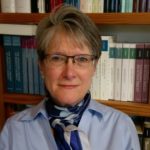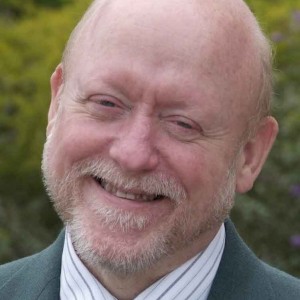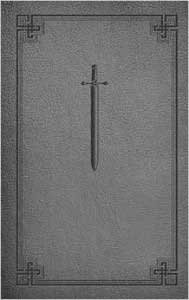Podcast: Play in new window | Download (Duration: 11:03 — 7.7MB) | Embed
Subscribe: Apple Podcasts | Spotify | Amazon Music | Android | Pandora | iHeartRadio | JioSaavn | Podchaser | Gaana | Podcast Index | Email | TuneIn | Deezer | Anghami | RSS | More
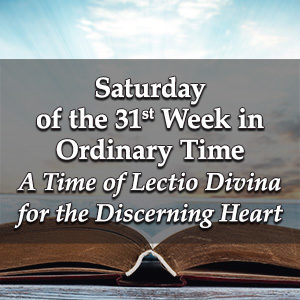 Saturday of the Thirty-First Week in Ordinary Time – A Time of Lectio Divina for the Discerning Heart Podcast
Saturday of the Thirty-First Week in Ordinary Time – A Time of Lectio Divina for the Discerning Heart Podcast
As you begin, take a deep breath and exhale slowly. For at least the next few moments, surrender all the cares and concerns of this day to the Lord.
Say slowly from your heart “Jesus, I Trust In You…You Take Over”
Become aware that He is with you, looking upon you with love, wanting to be heard deep within in your heart…
From the Holy Gospel According to St. Luke 16:1-8
Jesus said to his disciples: ‘I tell you this: use money, tainted as it is, to win you friends, and thus make sure that when it fails you, they will welcome you into the tents of eternity. The man who can be trusted in little things can be trusted in great; the man who is dishonest in little things will be dishonest in great. If then you cannot be trusted with money, that tainted thing, who will trust you with genuine riches? And if you cannot be trusted with what is not yours, who will give you what is your very own?
‘No servant can be the slave of two masters: he will either hate the first and love the second, or treat the first with respect and the second with scorn. You cannot be the slave both of God and of money.’
The Pharisees, who loved money, heard all this and laughed at him. He said to them, ‘You are the very ones who pass yourselves off as virtuous in people’s sight, but God knows your hearts. For what is thought highly of by men is loathsome in the sight of God.’
What word made this passage come alive for you?
What did you sense the Lord saying to you?
Once more give the Lord an opportunity to speak to you:
Jesus said to his disciples: ‘I tell you this: use money, tainted as it is, to win you friends, and thus make sure that when it fails you, they will welcome you into the tents of eternity. The man who can be trusted in little things can be trusted in great; the man who is dishonest in little things will be dishonest in great. If then you cannot be trusted with money, that tainted thing, who will trust you with genuine riches? And if you cannot be trusted with what is not yours, who will give you what is your very own?
‘No servant can be the slave of two masters: he will either hate the first and love the second, or treat the first with respect and the second with scorn. You cannot be the slave both of God and of money.’
The Pharisees, who loved money, heard all this and laughed at him. He said to them, ‘You are the very ones who pass yourselves off as virtuous in people’s sight, but God knows your hearts. For what is thought highly of by men is loathsome in the sight of God.’
What did your heart feel as you listened?
What did you sense the Lord saying to you?
Once more, through Him, with Him and in Him listen to the Word:
Jesus said to his disciples: ‘I tell you this: use money, tainted as it is, to win you friends, and thus make sure that when it fails you, they will welcome you into the tents of eternity. The man who can be trusted in little things can be trusted in great; the man who is dishonest in little things will be dishonest in great. If then you cannot be trusted with money, that tainted thing, who will trust you with genuine riches? And if you cannot be trusted with what is not yours, who will give you what is your very own?
‘No servant can be the slave of two masters: he will either hate the first and love the second, or treat the first with respect and the second with scorn. You cannot be the slave both of God and of money.’
The Pharisees, who loved money, heard all this and laughed at him. He said to them, ‘You are the very ones who pass yourselves off as virtuous in people’s sight, but God knows your hearts. For what is thought highly of by men is loathsome in the sight of God.’
What touched your heart in this time of prayer?
What did your heart feel as you prayed?
What do you hope to carry with you from this time with the Lord?
Our Father, who art in heaven,
hallowed be thy name.
Thy kingdom come.
Thy will be done on earth, as it is in heaven.
Give us this day our daily bread,
and forgive us our trespasses,
as we forgive those who trespass against us,
and lead us not into temptation,
but deliver us from evil.
Amen



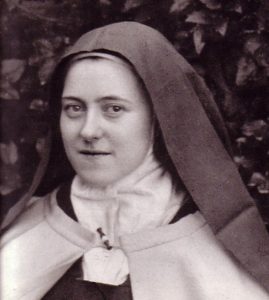
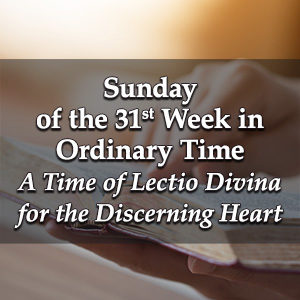 Sunday of the Thirty-First Week in Ordinary Time – A Time of Lectio Divina for the Discerning Heart Podcast
Sunday of the Thirty-First Week in Ordinary Time – A Time of Lectio Divina for the Discerning Heart Podcast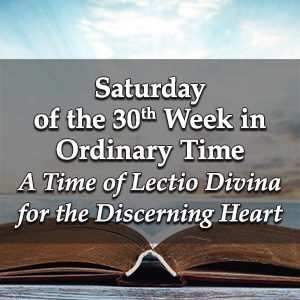 Saturday of the Thirtieth Week in Ordinary Time – A Time of Lectio Divina for the Discerning Heart Podcast
Saturday of the Thirtieth Week in Ordinary Time – A Time of Lectio Divina for the Discerning Heart Podcast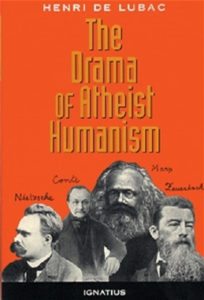 You can find the book
You can find the book 
